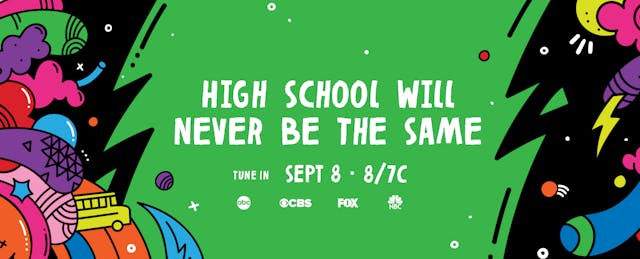Thank goodness Justin Timberlake received an education. Otherwise, he may not have been able to read from a teleprompter.
The pop star’s attempt at a self-deprecating joke was one of the many celebrity cameos that littered XQ Super School Live, an hour-long extravaganza that aired on ABC, CBS, FOX and NBC last Friday evening. (You can watch it here.) In all, the television special boasted more than 60 Hollywood A-listers who sang, danced, and emceed their way to urge viewers to “rethink the formula for education.” The high-production spectacle drew an estimated 8.43 million viewers across the four channels.
The event was produced as a collaboration between the Entertainment Industry Foundation and the XQ Institute, a nonprofit backed by Laurene Powell Jobs. XQ is no stranger to splashy media campaigns; just a couple years ago it plastered billboards and bus stops across the country to promote a $100 million challenge to redesign America’s high schools. (Here are the 13 that received funding.)
But if the point of the extravaganza was to promote change, it missed the mark by airing tired arguments that schools have stayed static through the decades, and consequently glossing over the extraordinary hard work of millions of American teachers.
Star-studded primetime events can trigger just as much skepticism as inspiration. Count education reporters in that first group, who quibbled with the show’s premise that high school “is a system that hasn’t changed in 100 years.”
Education historians interviewed by Chalkbeat said that while the “basic setup of schooling has remained largely intact,” the democratization of access to high school, along with the different skills and subjects kids learn, constitute big shifts. Long-time education correspondent John Merrow listed just a few landmark policies and research that have shaped who gets to go to school—and what they experience. Valerie Strauss, education writer for The Washington Post, bemoaned the use of celebrities to push a “faulty narrative.”
Channeling at times High School Musical, this made-for-TV special resembled a heartwarming, kumbaya moment, uniting entertainers and educators through song and dance. (The show ended with a cover of The Beatles’ “Come Together.”) Tom Hanks and James Corden karaoked on a school bus. Lin-Manuel Miranda revisited his theater teacher at Hunter College High School in New York, accompanied by performance footage from his younger days.
The dazzling animations and choreography certainly lent itself to a feel-good atmosphere, an optimism that offers a cheerful respite from an otherwise drab news cycle of political and natural turmoil.
Yet not all that glitters is gold. For those who don’t enjoy Glee, or are otherwise numb to the showmanship and facade of the entertainment industry, the event might have smacked of a cloying attempt to make education reform hip, fun and cool. (Please excuse my personal aversion to musicals.) The celebrity firepower felt like overkill, a cast of A-listers paying lip service to the cause.
And that’s a shame, because many of the stars in the show probably do care about education, and have given back to their communities. Most recently, Chance the Rapper announced a $2.2 million donation to arts education programs at Chicago Public Schools. Oakland Raiders running back Marshawn Lynch often donates money and time to support the underprivileged youth in his hometown.
Sprinkled in between the skits and performances were brief profiles of XQ awardee schools, as narrated by their students and educators. They offered the rare moments in the show that felt unscripted.
What’s most frustrating is that the show doesn’t do much to explore its central premise: So why isn’t school working? Why didn’t Samuel L. Jackson “learn to speak real Spanish?” Why didn’t Christian Slater “learn what it’s actually like to live in the real world?” We don’t actually learn about what’s wrong with the system—let alone more serious and somber issues like equity, segregation, school funding, teacher shortages and poverty that factor mightily into anyone’s education experience.
Without exploring these details, the show came across as a wholesale critique of the education system—and those working in it. A few educators took their issues to Twitter. Aaron Baker, an 8th grade history teacher in Oklahoma, counted “Seven Times ‘XQ Super School Live’ Denigrated America’s Teachers (And One Time It Praised Them).” A former English and theater teacher wrote:
to insist that high schools haven’t changed in the last 100 years denies the innovations created by high school alumni of the recent past, who have led the way to the most dynamically changing culture ever known. It denies the skills and talents of all those handsome, smiling, singing and dancing faces and bodies that performed so adeptly on Friday night during XQLive, because it is the programs in high schools across America that have nurtured the beginnings of those skilled and innovative performers and thinkers.
Throughout the show, various celebrities urged viewers to take action by sending a text. But for what purpose it was not clear. (I texted “XQLIVE” to 225568, the number on the screen but have yet to learn what I signed myself up for.) The most specific call to action came near the end, when actor and social activist Jesse Williams urged viewers to learn more about their local school boards. “School boards are incredibly powerful place,” said the former teacher. “They decide what schools are our kids attend, what they learn, who and how our schools are managed.”
What’s even more impactful, he said: consider serving on a school board yourself—but not before sending a text message to receive a XQ Super School Board program kit.
Sorry for being a killjoy. Look, education deserves all the support and attention it can get. Overworked, underappreciated and undercompensated teachers deserve to be celebrated. But let’s not fabricate an oversimplified narrative to justify shining the spotlight. In doing so, it may just end up alienating the very people one intends to serve.


